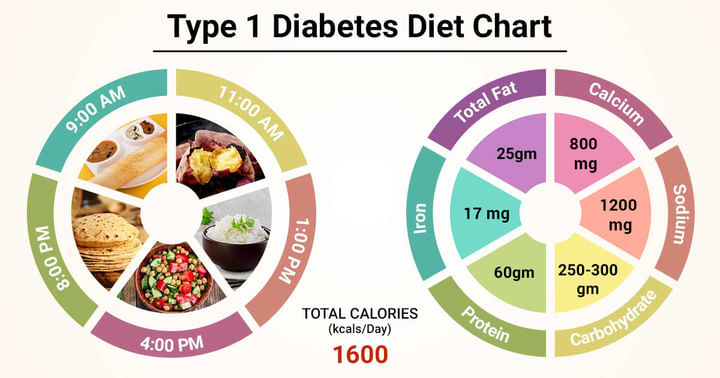Get the App
For Doctors
Login/Sign-up
About
Health Feed
Find Doctors
Diet Chart For type 1 diabetes
Last Updated: Jan 20, 2025
About
Type 1 diabetes patients are insulin dependent as the pancreas produce little or no insulin. Insulin is needed to allow glucose to enter the body cells to generate energy. For type 1 diabetes patients, it is necessary that blood glucose levels are maintained within a limit with proper type 1 diabetes diet. However, one should not be confused with eating zero carbohydrates. Insulin taken may drop the blood glucose level to drop very low, therefore, the meal should include the proper amount of carbohydrates.
There is no particular Type 1 diabetes diet, but it is recommended that you should always follow a proper diet to keep yourself away from any kind of “Emergency Diet”. Proper diet may include a balanced diet consisting of the adequate amount of starch, sugar, and fibers. Some carbohydrates act faster than the other, fast-acting carbs can be consumed such as fruits, fruit juice, green leafy vegetables, carrots, sprouts, beets, onions, cucumbers, etc. All in all, carb counting is very important while consuming food.
If one wants to eat fat, the effect of high fat should be kept in mind. The high amount of fat delays the rate at which stomach empties so optimum amount should be taken. Animal fat should be avoided if one has type 1 diabetes. Ultimately, it’s about maintaining the blood glucose level by not letting it get out of the range.
Diet Chart
| Sunday | |
| Breakfast (8:00-8:30AM) | Ragi dosa-2 +2 tsp methi chutney+1 glass milk(toned)/1 cup tea |
| Mid-Meal (11:00-11:30AM) | 1/2 cup of roasted sweet potato salad with 1 tsp olive oil |
| Lunch (2:00-2:30PM) | 1 cup parboiled rice +2 roti+100gm fish(tuna/sardine/salmon/mackerel) curry+1/2 cup soya chunk and aloo sabji |
| Evening (4:00-4:30PM) | 1/2 cup of boilled bengal gram with onion, tomato and corriander |
| Dinner (8:00-8:30PM) | 3 roti/ 1 cup parboiled rice+1/2 cup ridge gourd sabji+1 glass buttermilk |
| Monday | |
| Breakfast (8:00-8:30AM) | Dalia upma-1.5 cup with vegetables(potato,onion,tomato,green peas, carrot)+1 glass milk(toned)/1 cup tea |
| Mid-Meal (11:00-11:30AM) | 1 wedge of papaya |
| Lunch (2:00-2:30PM) | 1 cup parboiled rice+2 roti+1/2 cup cabbage dal+1/2 cup chicken curry+1 glass buttermilk |
| Evening (4:00-4:30PM) | 1/2 cup of beetroot, carrot and broccoli salad with 1 tsp olive oil+1 cup green tea |
| Dinner (8:00-8:30PM) | 3 multi grain roti (jowar, bajra, wheat)/ 1 cup parboiled rice+1/2 cup ivy gourd sabji+1 glass buttermilk |
| Tuesday | |
| Breakfast (8:00-8:30AM) | Egg sandwich (Toasted whole wheat bread- 4 slices+ eggs-2)+ 1 glass milk(toned)/1 cup tea |
| Mid-Meal (11:00-11:30AM) | 1 cup of orange and grape fruit salad |
| Lunch (2:00-2:30PM) | 1 cup parboiled rice+2 jowar roti+1/2 cup tomato dal+1/2 cup cluster beans curry+1 glass buttermilk |
| Evening (4:00-4:30PM) | 1 small fist of peanuts,raisins,almonds,walnuts+1 cup green tea |
| Dinner (8:00-8:30PM) | 3 roti/ 1 cup parboiled rice+1/2 cup bhindi sabji+1 glass buttermilk |
| Wednesday | |
| Breakfast (8:00-8:30AM) | Idly-4+sambhar-1/2 cup+green chutney-2 tsp+1 glass milk(toned)/1 cup tea |
| Mid-Meal (11:00-11:30AM) | 1 cup of pomegranate seeds |
| Lunch (2:00-2:30PM) | 4 roti+1/2 cup palak dal+1/2 cup bitter gourd sabji+1 glass buttermilk |
| Evening (4:00-4:30PM) | 1/2 cup of stewed tuna and leek salad+1 cup green tea |
| Dinner (8:00-8:30PM) | 3 multigrain roti (bajra, oats, ragi)/ 1 cup parboiled rice+1/2 cup snake gourd sabji+1 glass buttermilk |
| Thursday | |
| Breakfast (8:00-8:30AM) | 1 cup oats and milk porridge |
| Mid-Meal (11:00-11:30AM) | 1/2 cup banana and oats porridge |
| Lunch (2:00-2:30PM) | 4 roti+100gm fish(tuna/sardine/salmon/mackerel with little olive oil)-grilled/stewed+1/2 cup rajmah curry |
| Evening (4:00-4:30PM) | 1/2 cup of boilled green gram with tomato, onion and corriander |
| Dinner (8:00-8:30PM) | 3 roti/ 1 cup parboiled rice+1/2 cup bittergourd sabji+1 glass buttermilk |
| Friday | |
| Breakfast (8:00-8:30AM) | Roasted oats upma-1 cup with vegetables(potato,onion,tomato,green peas, carrot)+1 glass milk(toned)/1 cup tea |
| Mid-Meal (11:00-11:30AM) | 100gm pine apple |
| Lunch (2:00-2:30PM) | 1 cup parboiled rice+2 bajra roti+1/2 cup methi dal+1/2 cup french beans sabji+1 glass buttermilk |
| Evening (4:00-4:30PM) | 1 glass avocado(75gm) milkshake(milk-150ml-toned) |
| Dinner (8:00-8:30PM) | 3 multi grain roti (corn flour, wheat, oats)/ 1 cup parboiled rice+1/2 cup lauki sabji+1 glass buttermilk |
| Saturday | |
| Breakfast (8:00-8:30AM) | Omelette-2+ 1 glass milk(toned)/1 cup tea |
| Mid-Meal (11:00-11:30AM) | 6-7 strawberries |
| Lunch (2:00-2:30PM) | 4 bajra roti+1/2 cup lauki dal+1/2 cup green peas and capsicum sabji+1 glass buttermilk |
| Evening (4:00-4:30PM) | 1 glass milk(toned)+2-3 ragi biscuits) |
| Dinner (8:00-8:30PM) | 3 roti/ 1 cup parboiled rice+1/2 cup cauliflower sabji+1 glass buttermilk |
Food Items To Limit
- Grains - white rice, pasta, flour, white bread, cookies, cakes, muffins has to be avoided as they have high glycemic index which may increase your blood glucose levels.
- Protein - red meat (beef, pork, lamb), fried, high-sodium meats, poultry with skin, deep-fried fish, processed meats like bacon- high in saturated fat and sodium which may cause other co-morbidities such as heart disease and hypertension.
- Dairy - whole milk, full-fat yogurt, full-fat cottage cheese, full-fat sour cream, ice cream- high in saturated fat.
- Fruits & Vegetables - dried fruit, fruit drinks, fruit juice drinks, pickles, canned fruits with sugar syrup, regular jam, jelly, and preserves- high glycemic index which may increase your blood glucose levels.
- Fats and Sugars - butter, pastries, mayonnaise, french fries, potato chips, doughnuts, cakes and cookies- high in saturated fat and high glycemic index.
Do's And Dont's
Do's:
- Do eat Vegetables such as Spinach, tomatoes, cucumbers, broccoli, brussels sprouts, cauliflower, and asparagus. They’re packed with nutrients and low in carbohydrates, which your body quickly breaks down into glucose.
- Do eat whole-wheat bread and pasta, brown rice, and oats. Whole-grain starches give you more vitamins, minerals, and fiber than white or refined versions. They’re also less likely to lead to rapid spikes in blood sugar.
- Do eat small servings of peaches, apples, oranges, berries, kiwi, and other fruits. Fruit is a low-calorie, high-fiber, nutrient-rich source of carbohydrates.
- Do eat skinless poultry, fish, tofu, beans, and lean cuts of red meat.
- Do eat unflavored and low-fat yogurt, milk, and cheese. Low-fat dairy gives you protein, calcium, vitamins, and minerals in every serving.
Don'ts:
- Fried and breaded vegetables – they add extra calories, carbs, and fat.
- White bread, chips, and pastries, which quickly increase blood sugar.
- Jellies and fruit juices with added sugar.
- Full-fat dairy products. They come with extra calories and saturated fat, which raises LDL or “bad” cholesterol. Remember diabetes increases your risk of heart disease.
- Fatty cuts of meat and processed meat, like sausages and hot dogs.
Food Items You Can Easily Consume
- Cereals: Brown rice, Oat meal, Broken wheat, Ragi, Quinoa.
- Pulses: Chickpeas, Kidney beans, moong dal, masoor dal, soybeans.
- Vegetables: All gourds-bitter gourd, snake gourd, ridge gourd, bottle gourd, ivy gourd, ladies finger, tinda,green leafy vegetables.
- Fruits: Melons, apple, pine apple, papaya, citrus fruits, guava, berries etc.,
- Milk and Milk products: Skim milk, Paneer, Cottage Cheese, Yoghurt.
- Meat, Fish and Egg: Lean Meat, Skin out chicken, Tuna, Salmon, mackerel and sardines, egg white.
- Oil:
- 5 Tbsp/ day( Olive oil, Mustard Oil, Rice bran Oil, Canola oil
- Sugar: 2 Tsp/ day.
- Other beverages: Green tea.
References
- Mühlhauser I, Bott U, Overmann H, Wagener W, Bender R, Jörgens V, Berger M. Liberalized diet in patients with type 1 diabetes. Journal of Internal Medicine. 1995 Jun;237(6):591-7. [Cited 01 July 2019]. Available from:
- Patton SR. Adherence to diet in youth with type 1 diabetes. Journal of the American Dietetic Association. 2011 Apr 1;111(4):550-5. [Cited 01 July 2019]. Available from:
- Scaramuzza AE, Mantegazza C, Bosetti A, Zuccotti GV. Type 1 diabetes and celiac disease: The effects of gluten free diet on metabolic control. World journal of diabetes. 2013 Aug 15;4(4):130. [Cited 01 July 2019]. Available from:
Book appointment with:
Delhi
Mumbai
Chennai
Bangalore
Index
Table of content
Content Details
Written ByDrx Hina FirdousPhD (Pharmacology) Pursuing, M.Pharma (Pharmacology), B.Pharma - Certificate in Nutrition and Child CarePharmacology
Reviewed By
Find Dietitian/Nutritionist near me
Ask a free question
Get FREE multiple opinions from Doctors
posted anonymously



